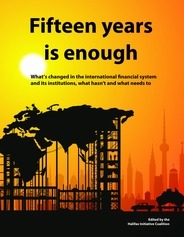Policy Brief: The Financial Transaction Tax (FTT) - An idea whose time has come - April 2010
Introduction
A growing number of politicians, civil society organizations, economists and some financiers have become strong advocates of a global Financial Transactions Tax (FTT). An FTT is a tiny tax on financial market transactions such as equity, bond, derivative or foreign exchange trades.
Political leaders, including the presidents of France and Germany and the prime minister of Britain, back an FTT as one of the best ways to fund programs to fight world poverty, pay for climate mitigation and adaptation costs and make financial institutions pay their fair share of the costs of the global crisis which, in large part, was created by their practices. Prominent economists advocate a Financial Transactions Tax as one way to cool down excessive speculation in financial markets, a principal cause of the economic crisis.
